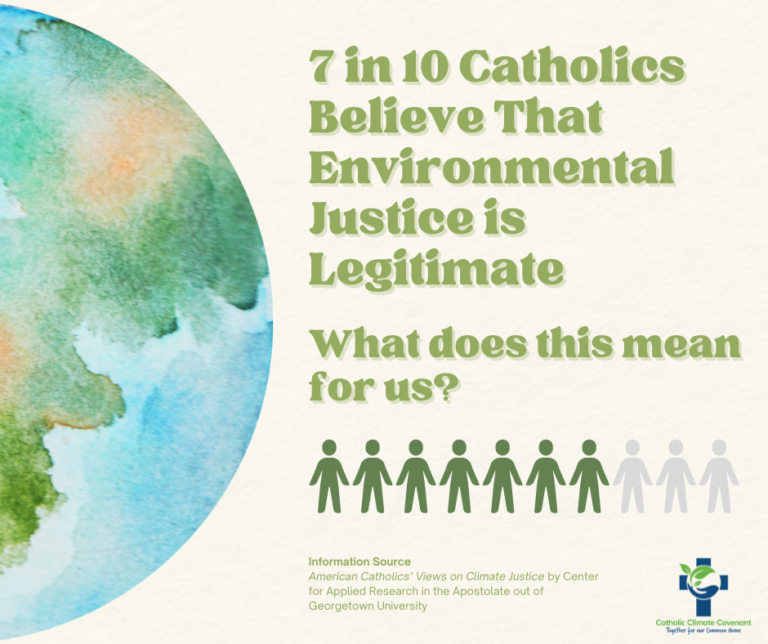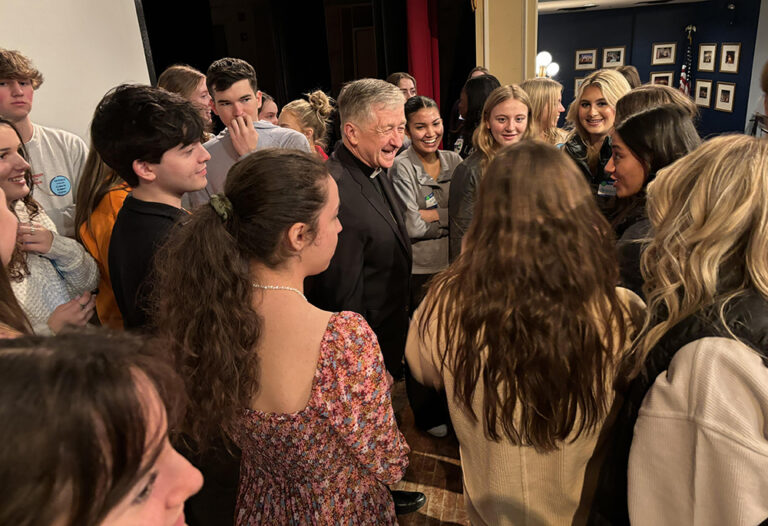Hundreds of U.S. Catholic social ministry leaders came together recently for the annual Catholic Social Ministry Gathering. Over four days, and from their many Zoom rooms, attendees examined new models of justice and solidarity in light of the disparities revealed and amplified by COVID-19. As an attendee myself, I found that the reverberations of Pope Francis’s vision of integral ecology left unmistakable traces throughout the gathering. This integral ecology is well captured by the passage from Laudato Si’ that was included at the opening of the backgrounder on environmental justice and health offered by organizers of this year’s gathering:
“Today, however, we have to realize that a true ecological approach always becomes a social approach; it must integrate questions of justice in debates on the environment, so as to hear both the cry of the earth and the cry of the poor.” –Pope Francis, Laudato Si’, June 18, 2015
It reminded me of a recent Catholic Climate Covenant webinar on environmental justice, in which Dr. Catherine Wright, Associate Professor of Religion and Philosophy at Wingate University, turned to the same passage as she sought to establish the centrality of environmental justice to the Catholic faith. “As Catholics we have a special voice to speak about justice,” she contended, “but it can only happen when creation care is not seen as optional but as an actual core moral issue for Catholics.”
To make her case, Dr. Wright wove together the theological insights of Laudato Si’ with the tools of social analysis—in particular the concept of intersectionality, first articulated by Dr. Kimberlé Crenshaw to describe the impact of overlapping experiences of oppression on Black women. In doing so, Dr. Wright not only made a compelling case for the inseparability of care for creation and care for the poor; she also offered rich entry points for prayer and reflection on our interdependence with all of life, demonstrating how this view is not only resonant with Catholic doctrine but indeed embedded within it.
“Pope Francis and the Catechism of the Catholic Church are very clear,” Dr. Wright emphasized. “God wills the interdependence of creatures. Creatures exist only in dependence on each other, to complete each other, in the service of each other. We have not lived these truths very well, and the path to right relationship starts with an awareness of our common origin, our mutual belonging, and our shared destiny.” She went on to mine Catholic doctrine for “signposts” that point the way toward the possibility of right relationship within creation, engaging with theologies of the incarnation, the Trinity, and creation to demonstrate how they each offer foundations for an integral ecology that responds at once to the cries of the earth and the cries of the poor.
One of the questions I carry with me in my work directing the Covenant’s Youth and Young Adult Mobilization initiatives is what spiritual resources the Catholic faith has to offer to the movements to build a just and livable future. Generationally speaking, U.S. young people’s relationship to religion is complex and nuanced. To borrow the language of the old Facebook relationship status, “it’s complicated.”
According to a study by the Springtide Research Institute, 61% of young people ages 13 to 25 consider themselves affiliated with a religion, but affiliation alone tells us much less than it would have for earlier generations, with significant numbers of affiliated young people turning outside of religion for their sense of community and their guidance around how to live their lives. Things are no less nuanced for those young people who identify as unaffiliated: many continue to engage with religion and spirituality in complex ways. Most notably, according to the study, 60% of unaffiliated young people identify as being at least slightly spiritual. Meanwhile, young people express increasingly positive sentiments toward diversity and themselves represent an increasingly diverse subset of the population. This certainly tracks with my own past experience working in college campus ministry: regardless of their relationship to any particular faith tradition, I found that the students who attended the retreats I coordinated were yearning for spiritual practices spacious enough to meet them where they were, hungry for authentic community that would hold them lovingly in their growth, and unwavering in their commitment to justice. Whether they are turning to organized religion to satisfy it or not, young people’s thirst for meaning and purpose is strong as ever.
And, as Pope Francis so compellingly articulates in Laudato Si’, the struggle against climate change “cannot be sustained by doctrine alone, without a spirituality capable of inspiring us, without an ‘interior impulse which encourages, motivates, nourishes and gives meaning to our individual and communal activity’” (216). Whether as individual actors or as collective movements, we remain oriented toward the ultimate by virtue of our human nature, and we need spiritual practices that are capable of meeting us where we are and inviting us into ever deeper love and tender mercy—for ourselves and for our many creaturely and green neighbors, human and otherwise.
Whatever your relationship to Catholicism—devout, estranged, curious, or questioning—I invite you to explore how the spiritual treasures of Catholic Social Teaching might meet you wherever you are in your journey and offer sustenance as you work to protect our common home. The particular challenges presented by the overlapping crises of our historical moment require a new way of understanding what it means to be human—what Pope Francis calls an “adequate anthropology” (118).
This new way is one that begins with the acknowledgement of our interdependence with all of creation, and that understands that the cries of the creation are inseparable from the cries of the poor. If you are looking for a place to start, I encourage you to spend a few minutes with Dr. Wright and her co-presenter, Veronica Coptis of the Center for Coalfield Justice, in part 1 of the Covenant’s webinar series, “A Laudato Si’ Lens on Environmental Justice.”
And if you are a young person between the ages of 18-39, I also invite you to bring your exploration to the table at our upcoming event kicking off our Youth and Young Adult Mobilization initiatives, “Emergence: A Creation Care Gathering for Young Catholics.” This moment needs you, exactly as you are. Come with all of your doubts, your brokenheartedness, your messy and lovely ways of being in process, and help this moment become a movement.


